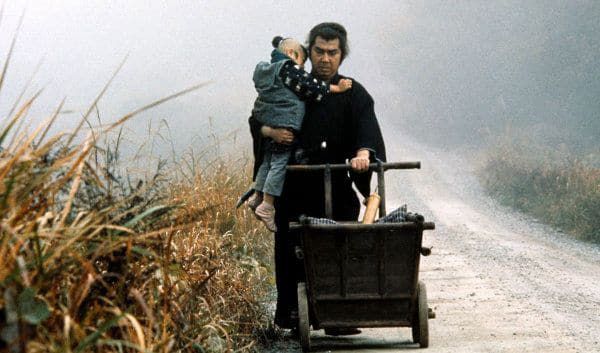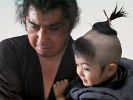Eye For Film >> Movies >> Lone Wolf And Cub: Sword Of Vengeance (1972) Film Review
Lone Wolf And Cub: Sword Of Vengeance
Reviewed by: Jennie Kermode

Few film series have had as much impact as Kenji Misumi's Lone Wolf And Cub. Decades before Hollywood got into comic adaptations, this translation of Kazuo Koike's manga, which vividly recreates the style of the original, set the tone for a whole genre, as well as influencing the video game adaptation of the manga and two TV series. It combines slapstick violence with brilliantly choreographed fight scenes and stunning cinematography, cheesy vignettes with a powerful backstory. Also going by the names Sword Of Vengeance and Baby Cart, the series now faces the prospect of a Hollywood remake. It's unlikely to capture the magic of the original.
Tomisaburô Wakayama is Ogami Itto, a former state executioner who goes on the run with his newborn son after being betrayed by members of the Ura-Yagy? clan. Having lost his honour, he no longer considers himself human and decides to walk the demon path, little Daigoro (Akihiro Tomikawa) at his side. Together they hire themselves out as assassins; though Daigoro must be carried whilst his father fights, his hair is cut in traditional ronin style. Itto is determined to avenge his clan, but for the meantime he must focus on earning a living and surviving the various assassins who come after him. Of course, there's some more general righting of injustice along the way.

Misumi employs a vibrant colour palette, making particularly striking use of red, from silk robes to gushing blood. His dripping roofs, upward-winding roads and low waterfalls became staple images in the genre, and some of the fight sequences here have echoed through the years. This highly stylised approach extends to the dialogue, and in combination with cultural differences for those outside Japan (or from a different generation), it can make some scenes unintentionally comedic. Similarly, Misumi's tendency to cut away during challenging fight scenes and then pan back to scattered, squirting limbs is likely to make viewers laugh, but Wakayama plays it all so straight and with such dignity that he holds it together. Tomikawa, meanwhile, is effortlessly cute but also has a stubborn quality which lends itself well to his role and means we actually get to know Daigoro as a character rather than seeing him simply as an object to be protected.
Our heroes' wanderings provide plenty of opportunity to take in dramatic locations, though Misumi shows a preference for mid-range shots which focus on detail. They also take us on a tour through many aspects of bushido culture, and the historical detail is impressive even when some of the sets are not. Lone Wolf And Cub will not be to everybody's tastes but it has plenty to recommend it, and it's something that students of film should make sure not to miss.
Reviewed on: 06 Mar 2017
















